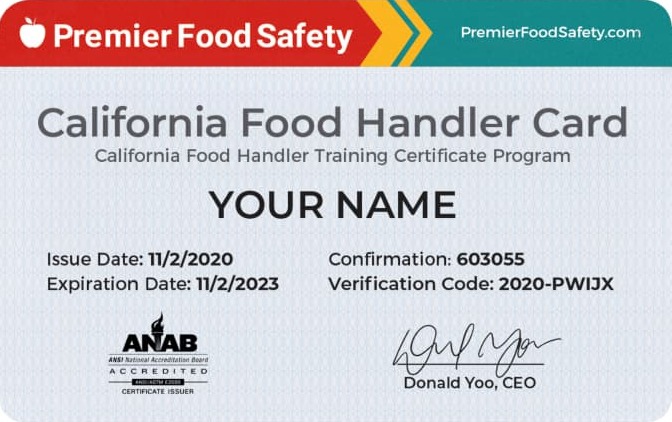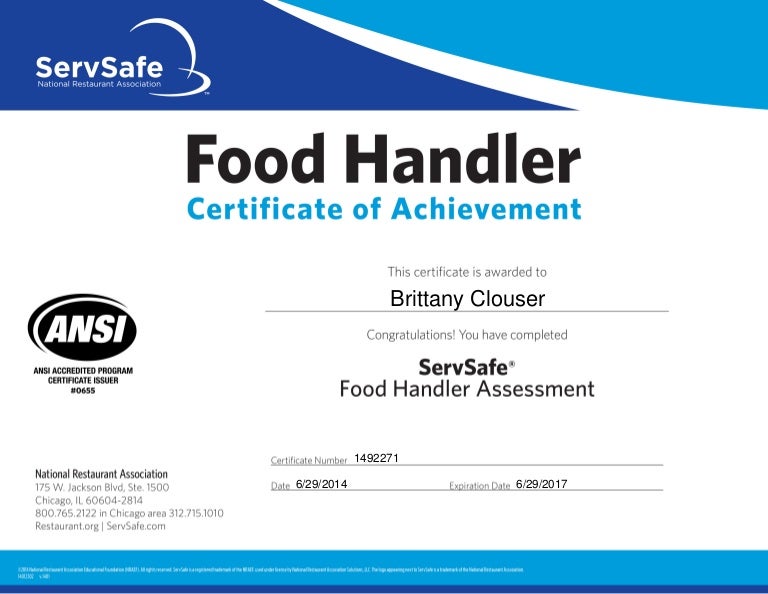Steps to Ending Up Being a Certified ServSafe Food Handler in Your State
Steps to Ending Up Being a Certified ServSafe Food Handler in Your State
Blog Article
Get Qualified: Master Food Safety And Security With Food Trainer Accreditation
The importance of getting a Food Handler Accreditation can not be overstated in today's food solution landscape. As the sector encounters raising scrutiny pertaining to food safety and security requirements, understanding the accreditation procedure and its ramifications comes to be crucial.

Value of Food Safety Qualification
Food safety accreditation is crucial for making certain that food trainers are equipped with the expertise and skills required to maintain high standards of health and safety in cooking and service. This certification not only boosts the proficiency of people operating in the food sector yet additionally fosters a society of safety and security that benefits both consumers and workers.
By getting food safety qualification, food handlers come to be knowledgeable about essential practices such as appropriate food storage, cross-contamination prevention, and personal health standards. ServSafe Food Handler Certification. This understanding substantially decreases the risk of foodborne ailments, which can have extreme health effects and effect public count on food establishments. Qualified food handlers are better prepared to abide with national and regional policies, consequently lessening the threat of lawful obligations and fines for food companies.
Furthermore, having actually certified team can enhance a facility's online reputation, as customers increasingly focus on safety in their dining experiences. Eventually, food safety and security accreditation is not simply a regulative need; it is an essential investment in the general high quality and dependability of food solution operations, cultivating trust and making certain that safety and security continues to be a top concern in the industry.

Introduction of Certification Process
Protecting food safety and security accreditation includes an organized procedure designed to outfit food handlers with the required understanding and abilities. This process usually begins with choosing an approved training program, which can be provided in different layouts such as in-person courses, on the internet courses, or hybrid options. Individuals must select a program that meets regional governing requirements and aligns with their learning choices.
Once registered, prospects participate in thorough training that covers important food security ideas and methods - ServSafe Food Handler. This training commonly consists of interactive components, real-world circumstances, and analyses to reinforce knowing. After completing the coursework, participants should pass an accreditation examination that examines their understanding of food security principles
Upon effectively clearing the exam, individuals receive their food trainer certification, which is generally valid for a specific period, usually ranging from one to three years. It is essential for licensed food handlers to remain upgraded with any type of modifications in food safety regulations and techniques, demanding regular renewal or proceeding education and learning. This accreditation process is vital for making certain that food trainers are well-informed about secure food managing methods, thereby reducing the threat of foodborne diseases and promoting public wellness.
Key Subjects Covered in Training
A detailed food handler training program commonly covers a number of key subjects vital for maintaining food security and avoiding foodborne ailments. Comprehending the concepts of food safety and security is foundational, consisting of the importance of correct hygiene techniques for food handlers. This consists of handwashing methods, appropriate use gloves, and personal cleanliness requirements.
Another essential location is the recognition and administration of food threats. Trainees find out about organic, chemical, and physical hazards, together with strategies for stopping cross-contamination. Temperature control is likewise emphasized, as preserving appropriate food preparation and storage temperatures is essential for inhibiting bacterial development.
The training program addresses secure food storage practices, outlining just how to properly classify and arrange food items to guarantee freshness and security. In addition, individuals are informed on cleansing and disinfecting treatments for tools and surfaces to get rid of possible impurities.

Benefits of Obtaining Qualified
Acquiring i was reading this food trainer accreditation supplies various benefits that extend past individual understanding and abilities. Firstly, it boosts an individual's understanding of risk-free food techniques, which is important in avoiding foodborne ailments. This expertise not only safeguards the health and wellness of customers but also promotes a society of food safety within the workplace.
Furthermore, qualification demonstrates a dedication to professionalism and trust and duty. Companies frequently like or require certified workers, identifying that certified individuals are more probable to comply with safety and security protocols and regulations. This can result in enhanced work environment performance and lowered responsibility for organizations, as trained staff are much better equipped to handle food safely.
Furthermore, obtaining certification can boost an individual's self-confidence in their duty within the food solution sector. This self-confidence can equate into much better customer care and fulfillment, as workers who comprehend food safety and security are more probable to connect effectively concerning cooking and handling.
Last but not least, lots of accreditation programs use updated training and resources, ensuring that qualified people stay informed concerning the most recent guidelines and best practices, therefore strengthening their function as knowledgeable professionals in the food safety and security landscape.
Occupation Opportunities in Food Security
The structure of food security expertise acquired via accreditation go to these guys opens a variety of job chances within the food sector. As food security policies come to be increasingly rigorous, companies look for qualified specialists to guarantee conformity and keep high standards.
Individuals with food trainer qualification can go after functions such as food safety and security inspectors, that assess facilities for adherence to health and wellness laws, or food safety supervisors, entrusted with implementing and establishing security methods in food processing plants or restaurants. Furthermore, duties in quality control and control are offered, where experts check manufacturing processes to mitigate risks related to foodborne health problems.
In addition, the expanding fad of food sustainability and organic items has actually created opportunities for food safety specialists who focus on recommending business on best methods. Those with an accreditation can additionally discover placements in education and learning and training, assisting to inform others regarding risk-free food managing techniques.

Final Thought
Food trainer qualification offers as a vital part in enhancing food safety and security within the food solution industry. By acquiring this accreditation, people not only obtain vital expertise and skills however additionally contribute to the general wellness and safety of consumers - ServSafe Food Handlers Card. The extensive training makes certain adherence to hygiene methods and danger monitoring, ultimately fostering a much safer eating setting. As food safety and security continues to be a priority, the accreditation opens up doors to many job opportunities in this important field.
By acquiring food safety and security certification, food handlers become familiar with important practices such as correct food storage, cross-contamination prevention, and individual health criteria.Protecting food security accreditation includes an organized process made to outfit food trainers with the needed understanding and skills. It is essential for certified food handlers to remain upgraded with Related Site any type of changes in food safety laws and methods, requiring periodic revival or continuing education.A thorough food trainer training program normally covers a number of key subjects vital for maintaining food safety and security and preventing foodborne ailments.Food trainer accreditation serves as an essential element in improving food security within the food solution industry.
Report this page